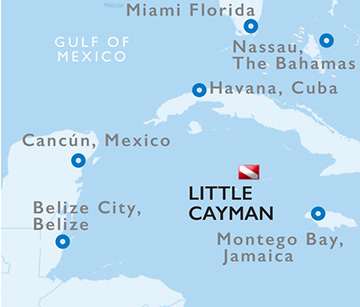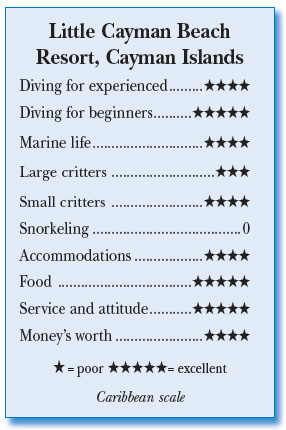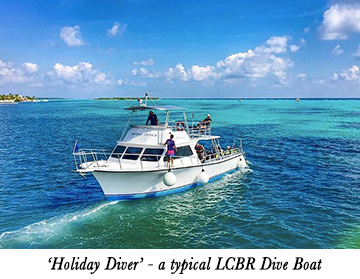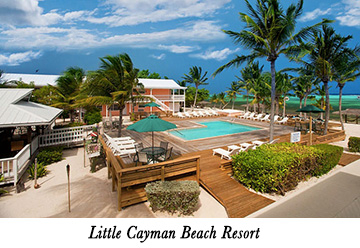Little Cayman Beach Resort, Cayman IslandsContents of this Issue: Little Cayman Beach Resort, Cayman Islands The Difficulty of Traveling to Little Cayman Lionfish Leather? Could It Be a Solution? Fiji, Indonesia, French Polynesia, Molokai Continuing Sherwood BC Troubles Amos Nachoum Authors a BIG Book And It’s a Must for Your Coffee Table What’s the Significance of “Advanced” in PADI AOW Certification? Decompression Stops: What We Don’t Know The Perils of Coral Cuts in Tropical Climates The Yucatan Stonewalls its Diving Deaths An Opinion about Liveaboard Safety Editorial Office: Ben Davison Publisher and Editor Undercurrent 3020 Bridgeway, Suite 102 Sausalito, CA 94965 among the best…. if you can get there from the July, 2022 issue of Undercurrent
Dear Fellow Diver: On my first visit to Little Cayman Beach Resort shortly after their 1993 opening, all I had to do on arrival was present my C-card, a credit card, and my smiling face. Not these days.
But, when I arrived in March at the 40-room LCBR, it was simply, "Hello, we know all about you. Here's your room key, and the bar is open." The days of a welcome drink are long gone. Undercurrent's undercover reviewers and readers alike have always given high marks to LCBR's diving, food, atmosphere, and hospitality. Arriving six weeks after their nearly two-year COVID shutdown, I wondered if they could pick up as they left off. Complicating matters, last year the owner, Clearly Cayman, shuttled their Little Cayman boats and crew to South Caicos Island, well over a 600-mile journey, to open their new East Bay Resort (see Undercurrent, January 2022, for a full review). Did they take LCBR's magic with them? I was eager to get into the water at the famous Bloody Bay Wall, but the first morning the brisk wind and 2- to 3-foot swells concerned me. Sure enough, we were relegated to a small protected area on the south side for our first dive, not far from LCBR. My 28 group members from a Missouri dive store have a wide range of physical abilities and diving skills, so it was too rough for us to reach the north side and Bloody Bay. As it turned out, Grays Reef was well above the Caribbean average. I was impressed with the healthy hard and soft corals, the colorful tube sponges, gorgonians, and the usual Caribbean reef citizens. Creole wrasse mingled with Bermuda chubs, while Nassau and black groupers allowed me to get close if I approached slowly. I watched a yellow wrasse clean the inside of a grouper's mouth while a Pederson's cleaner shrimp poked around inside its gills. I spotted plenty of bottom dwellers, including spiny lobsters, channel crabs, neck crabs hiding on branching coral, arrowline crabs, and small colonies of garden eels and yellow-headed jawfish ... even southern stingrays with bar jacks watching over them. Our divemaster, Tom, found a rare pipehorse hiding in Sargassum weed. Seventy-five-foot visibility and 79° to 82°F water portended a great week ahead. Indeed, I made 17 boat dives (there is no beach diving or snorkeling) in six days; however, no night dives due to the swollen seas. LCBR can handle 15 or more divers in each of their four 42-foot or 46-foot twin diesel Newton dive boats, which have well-designed cylinder racks, under-seat storage, low transoms, and excellent ladders. And a marine head, often useful for a two-tank morning dive. On board is a camera table and a freshwater hose, and at the dock, a camera rinse tank. Since the compressor could only pump 29 percent oxygen, not 32, we received a 10 percent discount on the cost. [Editors Note: A calculation: three percent less oxygen than expected is about 10%. However nitrox 32 is only 12 percent more oxygen than plain old air. So, shouldn't that three percent less oxygen mean a 25 percent reduction in price? The truth is, I don't recall ever hearing of an operation reducing the cost of Nitrox because it can't quite pump nitrox 32.] By the third day, the windy cold front was moving on, and we reached Bay Wall. At the Great Wall West, the shallow but vibrant hard pan reef, only 20 feet deep, falls directly into the abyss, providing the opportunity to cruise the edge of an underwater Grand Canyon. In 125-foot visibility, I drifted down to about 100 feet, leisurely finning along the wall of colorful hard corals, shrouded by soft corals, gorgonians, wire coral, colorful tube sponges, and sea fans. I peered into the numerous crevices and overhangs. I carried a flashlight to illuminate the large groupers, juvenile spotted drums, angelfish, snappers, French grunt, channel crabs, banded coral shrimp, neck crabs, and spiny lobster. In the blue, yellowtail snapper and occasional horse-eyed jacks cruised by. As the dive progressed, I worked my way up the wall, admiring a hawksbill turtle meandering through our pack of divers. Guardians of the reef that we are, we all resisted our temptation to touch it. As I came over the edge, a small gray reef shark spotted me, turned, and slowly swam into the blue. We finished this dive in the shallows under the boat, peering around under coral heads and soft corals looking for critters. This was how I remembered the Great Wall dives of Bloody Bay from 20 years ago. LCBR is back.
As usual, the food was good and so recognized by the three-foot-long rock iguanas that sidled up to our terrace table and gently waited for vegetarian droppings. They might first be spotted at 6:00 a.m., when coffee becomes available, and certainly at 6:45 when the ever-changing breakfast buffet opens. It included fruit juices, fruits, cereals, granola, scrambled eggs or eggs cooked to order (even eggs Benedict), sausage, home fries, pancakes or waffles, toasted bagels with lox and cream cheese and capers. Lunches featured make-your-own sandwiches (even barbecued beef or grilled burgers), French fries, and excellent homemade soups and bisques. Dinners could be beef rouladen, sliced roast beef -- rare to well-done, your call -- a casserole, grilled steaks, vegetables, and always a great salad bar. Vegetarians are well provided for. Because of the variety of tasty sauces and gravies, I'd bet there's a trained saucier chef in the kitchen. Some folks dressed for dinner, but the rules were only no bare feet or wet, dripping clothing. While there is both a large dining room (with a bar) and an adjacent screened in dining room, occasionally, I dined outside under the stars. The bar provided limited snack options until late in the evening.
Sitting 80 miles east of Grand Cayman, Little Cayman is but 10 miles long, its highest point 40 feet, its average about 10 feet. Fifty-seven percent of the surrounding waters, where all diving is conducted, is a marine park with permanent moorings. Even so, I saw too many lionfish and heard of no organized effort to remove them. But the truth is, it takes a lot of divers and a lot of time to clear them from the dive sites, and no way can they be removed from the entire park. Nonetheless, I think the dive operators on the island will need to do some regular culling and control their numbers around dive sites. One unique dive is the Soto Trader, a 120-foot inter-island tramp freighter, which caught fire and sunk in 1975. It's off Cayman Brac, about an hour's boat trip. Before the trip, a couple of annoyed divers grumbled about disliking wreck dives, but afterward, they and the rest of us were all grins. It was a great dive. In the 120-foot visibility, I could view the entire wreck, which is covered with colorful encrusting hard and soft corals, gorgonians, tube sponges, sea fans, feather dusters, and Christmas tree worms, all providing cover for blennies and other critters. It's an open wreck, and inside, a large green moray eel lurked. An eagle ray swam by slowly, and several 6-foot-tarpon hovered above, only edging away when I got within a few feet. For the many groupers, it was one big cleaning station. The bottom was just as fascinating as the wreck. I spotted southern stingrays in the surrounding sand, peacock flounder, and garden eels. Nearby coral heads had a frenzy of small reef fish, more than other reefs in the area. Nearby was a beautiful stand of elkhorn coral and even live staghorn coral, incredible corals that one sees little of these days. Schools of grunts, chubs, and creole wrasse patrolled the reef top. At a maximum depth of 50 feet and with no current, I spent more than an hour enjoying the marine life. After the third dive, it was back to my room to clean up or nap. The basic rooms are compact, well decorated, and comfortable, the ocean view rooms a tad more spacious. Even with air-conditioning, a good WIFI and a TV, there's little reason to spend time in them other than to nap, sleep, or shower.
Some divers kicked back in the large hot tub or chilled out in hammocks under the palapas. One day I strolled east down the road for a seat at the bar of the Southern Cross Club. One can take a short walk to the Little Cayman Museum. Artifacts from days gone by provide a fascinating history of the little island, currently with only about 80 full-time inhabitants other than itinerant resort workers. Birds became my daily entertainment, just by looking up to see the endless parade over the resort. The island has a large colony of red-footed boobies and a species of albatross with a 6- to 7-foot wingspread, and they at times mix with flocks of magnificent frigate birds. Just across the road from the LCBR (there's a bird-watching platform), the boobies take to the air and head to sea for the day. At dusk, they return, weighted down with fish they've caught. The frigate birds harass and torment them until they drop a fish or two, which the frigate birds snatch out of the air. I watched these incredible aerial acrobatics with a drink in hand, seated by the pool, at the same time watching doves pecking around the tables and small birds (banana tits?) hanging around the liquor bottles in the back of the bar to pick at the sweet residue on the liquor bottle stoppers.
While Jackson Bight, along Bloody Bay wall, supposedly offers a likelihood of encountering sharks, I only saw a lone grey reef shark in the distance. But I was impressed with the healthy colorful corals, tube and rope sponges on the walls, and the hard corals on the hardpan reef under the boat. I tried hard to shoot a beautiful juvenile yellowtail angelfish, iridescent blue with multiple tiny diamond-like spots like tiny stars. Still, it was too adept at hiding -- one hundred macro shots provided no image worth printing. But I have plenty of other shots and memories of Little Cayman Beach Resort. I can attest that it's back to its high standards, the diving remains some of the best in the Caribbean, and aside from the horrendous air service (see my sidebar), it's a must destination for divers headed to the Caribbean. --D.D. Our undercover author's bio: The author is a master diver, has been diving for more than 30 years, making 1600 dives around the world. Retired from rebreather and technical diving, he is a DAN undersea referral physician and has written several pieces for Undercurrent.
|

I want to get all the stories! Tell me how I can become an Undercurrent Online Member and get online access to all the articles of Undercurrent as well as thousands of first hand reports on dive operations world-wide
| Home | Online Members Area | My Account |
Login
|
Join
|
| Travel Index |
Dive Resort & Liveaboard Reviews
|
Featured Reports
|
Recent
Issues
|
Back Issues
|
|
Dive Gear
Index
|
Health/Safety Index
|
Environment & Misc.
Index
|
Seasonal Planner
|
Blogs
|
Free Articles
|
Book Picks
|
News
|
|
Special Offers
|
RSS
|
FAQ
|
About Us
|
Contact Us
|
Links
|
3020 Bridgeway, Ste 102, Sausalito, Ca 94965
All rights reserved.

 In 2022, l before I departed home, I had to present online my passport credentials, diving certifications, divers profile, medical history, medical diving waiver, COVID-19 vaccination record, signed legal liability waivers, dietary preferences, proof of trip insurance, temporary trip medical insurance, results of a recent COVID test . . . and pay with my credit card.
In 2022, l before I departed home, I had to present online my passport credentials, diving certifications, divers profile, medical history, medical diving waiver, COVID-19 vaccination record, signed legal liability waivers, dietary preferences, proof of trip insurance, temporary trip medical insurance, results of a recent COVID test . . . and pay with my credit card. Diving seems excessively regulated at LCBR, but in reality, it's more standard resort diving. During check-in at the dive shop, we all watched a video of LCBR's dive rules and dive boat policies, after which I signed a form stating that I had viewed these and agreed to comply. They were usual resort standards: no planned decompression diving, have a buddy, come back on the boat with 500 psi, and come up at 50 minutes. They encourage diving with a surface marker buoy. However, before the first dive aboard the Ocean Sister, the captain announced that he had additional rules and regulations. Oh, oh. Was I in the domain of a dive Nazi? Nah, simple stuff like taking off your wetsuits before lunch, removing them from the boat and hanging them on the drying racks (so they wouldn't complicate removing or restocking cylinders), things that led to more efficient loading and unloading of the boats, easier diving and improved boat safety, which makes the divers, divemasters, and company lawyers happy.
Diving seems excessively regulated at LCBR, but in reality, it's more standard resort diving. During check-in at the dive shop, we all watched a video of LCBR's dive rules and dive boat policies, after which I signed a form stating that I had viewed these and agreed to comply. They were usual resort standards: no planned decompression diving, have a buddy, come back on the boat with 500 psi, and come up at 50 minutes. They encourage diving with a surface marker buoy. However, before the first dive aboard the Ocean Sister, the captain announced that he had additional rules and regulations. Oh, oh. Was I in the domain of a dive Nazi? Nah, simple stuff like taking off your wetsuits before lunch, removing them from the boat and hanging them on the drying racks (so they wouldn't complicate removing or restocking cylinders), things that led to more efficient loading and unloading of the boats, easier diving and improved boat safety, which makes the divers, divemasters, and company lawyers happy. One early morning, I hopped on one of the complimentary bicycles to peddle down the road, having to dodge football-sized boobies flying five feet off the road and not caring a hoot about me. A head-on collision could have been nasty. I wonder how my insurance carrier would respond to a claim citing a "collision with booby while riding a bicycle"?
One early morning, I hopped on one of the complimentary bicycles to peddle down the road, having to dodge football-sized boobies flying five feet off the road and not caring a hoot about me. A head-on collision could have been nasty. I wonder how my insurance carrier would respond to a claim citing a "collision with booby while riding a bicycle"? At the end of the day, many divers would belly up to the Beach Nuts Bar, recognized for its collection of mementos hung from the ceiling by previous divers (the nearby Pirate's Point started that tradition a decade earlier). The resort provides supplies to encourage your imagination.
At the end of the day, many divers would belly up to the Beach Nuts Bar, recognized for its collection of mementos hung from the ceiling by previous divers (the nearby Pirate's Point started that tradition a decade earlier). The resort provides supplies to encourage your imagination.
 Sitting at the bar one afternoon, a divemaster noted that no one had seen a seahorse since the re-opening. The challenge was set. The next day at Marilyn's Cut, our divemaster, Kari, found a red-banded pipefish, a seahorse cousin, but no seahorse. In the shallows, where we seemed to see every possible fish-crustacean-coral-nudibranch species living around Little Cayman, my buddy discovered a dark-brown long-snout seahorse almost invisibly clinging to a gorgonian. Several photographers lined up to take shots. Later, it was apparent that the divemasters were slightly embarrassed that the first to spot a seahorse would be a mere dive tourist, not one of them.
Sitting at the bar one afternoon, a divemaster noted that no one had seen a seahorse since the re-opening. The challenge was set. The next day at Marilyn's Cut, our divemaster, Kari, found a red-banded pipefish, a seahorse cousin, but no seahorse. In the shallows, where we seemed to see every possible fish-crustacean-coral-nudibranch species living around Little Cayman, my buddy discovered a dark-brown long-snout seahorse almost invisibly clinging to a gorgonian. Several photographers lined up to take shots. Later, it was apparent that the divemasters were slightly embarrassed that the first to spot a seahorse would be a mere dive tourist, not one of them. Diver's Compass: 2022 Dive packages, with 6 two dives and breakfast and dinner, start at $1795/person, double occupancy . . . Paddle a free kayak about a mile out to the uninhabited Owen Island, or try out a paddleboard, or even tennis or basketball . . . .Clearly Cayman, a family-run dive resort business, also runs Cobalt Coast resort on Grand Cayman, Brac Reef Resort on Cayman Brac, and South Caicos Dive resort on South Caicos . . . 800-327-1323.
Diver's Compass: 2022 Dive packages, with 6 two dives and breakfast and dinner, start at $1795/person, double occupancy . . . Paddle a free kayak about a mile out to the uninhabited Owen Island, or try out a paddleboard, or even tennis or basketball . . . .Clearly Cayman, a family-run dive resort business, also runs Cobalt Coast resort on Grand Cayman, Brac Reef Resort on Cayman Brac, and South Caicos Dive resort on South Caicos . . . 800-327-1323. 